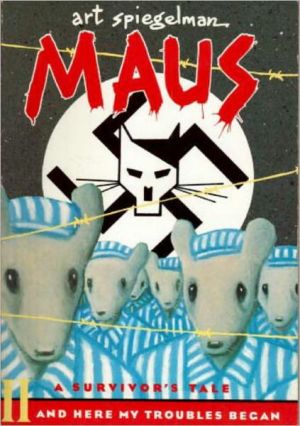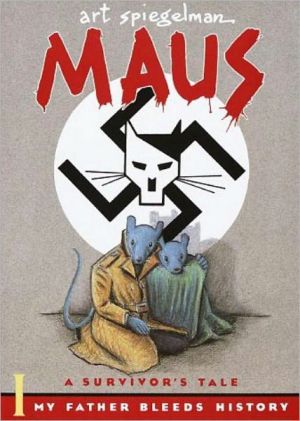Maus: A Survivor's Tale Volume 2: And Here My Troubles Began
***WINNER OF THE 1992 PULIZTER PRIZE***\ Acclaimed as a quiet triumph and a brutally moving work of art, the first volume of Art Spiegelman's Mausintroduced readers to Vladek Spieglman, a Jewish survivor of Hitler's Europe, and his son, a cartoonist trying to come to terms with his father, his father's terrifying story, and History itself. Its form, the cartoon (the Nazis are cats, the Jews mice), succeeds perfectly in shocking us out of any lingering sense of familiarity with the events...
Search in google:
MAUS was the first half of the tale of survival of the author's parents, charting their desperate progress from prewar Poland Auschwitz. Here is the continuation, in which the father survives the camp and is at last reunited with his wife.San Francisco ExaminerThe power of Spiegelman's story lies in the fine detail of the story and the fact that it is related in comic-strip form.
\ Wall Street Journal...[T]he most affecting and successful narrative ever done about the Holocaust.\ \ \ \ \ San Francisco ExaminerThe power of Spiegelman's story lies in the fine detail of the story and the fact that it is related in comic-strip form.\ \ \ Publishers Weekly\ - Publisher's Weekly\ Spiegelman's startling comic about the Holocaust, which revolves around his survivor father's experiences, won a 1992 Pulitzer Prize.\ \ \ \ \ School Library JournalTold with chilling realism in an unusual comic-book format, this is more than a tale of surviving the Holocaust. Spiegelman relates the effect of those events on the survivors' later years and upon the lives of the following generation. Each scene opens at the elder Spiegelman's home in Rego Park, N.Y. Art, who was born after the war, is visiting his father, Vladek, to record his experiences in Nazi-occupied Poland. The Nazis, portrayed as cats, gradually introduce increasingly repressive measures, until the Jews, drawn as mice, are systematically hunted and herded toward the Final Solution. Vladek saves himself and his wife by a combination of luck and wits, all the time enduring the torment of hunted outcast. The other theme of this book is Art's troubled adjustment to life as he, too, bears the burden of his parents' experiences. This is a complex book. It relates events which young adults, as the future architects of society, must confront, and their interest is sure to be caught by the skillful graphics and suspenseful unfolding of the story. -- Rita G. Keeler, St. John's School , Houston\ \ \ \ \ New York Times Books of the CenturyThe reader...develops insights that are beyond the capacity of the characters; that is a mark of Mr. Spiegelman's mastery of narrative.\ \ \ \ \ Kirkus ReviewsTogether with the much-acclaimed first volume of Spiegelman's Maus, this unusual Holocaust tale will forever alter the way serious readers think of graphic narratives (i.e., comic books). For his unforgettable combination of words and pictures, Spiegelman draws from high and low culture, and blends autobiography with the story of his father's survival of the concentration camps. In funny-book fashion, the all-too-real characters here have the heads of animals—the Jews are mice, the Nazis are rats, and the Poles are pigs—a stark Orwellian metaphor for dehumanized relations during WW II. Much of Spiegelman's narrative concerns his own struggle to coax his difficult father into remembering a past he'd rather forget. What emerges in father Vladek's tale is a study in survival; he makes it through by luck, randomness, and cleverness. Physically strong, he bluffs his way through the camps as a tinsmith and a shoemaker, and also exploits his ability with languages. Every day in Auschwitz, and later in Dachau, demands new bribes and masterly bartering. All of this helps explain Vladek's art of survival in the present: his cheap, miserly behavior; his disappointment over Spiegelman's marriage to a non-Jew; his constant criticism of his own second wife and his son; and even his inexcusable racism. Haunted by the brother who died in the camps, Spiegelman (born in postwar Sweden) also mourns his mother, who survived only to commit suicide in the late 60's. Within the time span of the writing of Maus (1978-91), Vladek died, and Spiegelman now must sort out his complex feelings as he reflects on the success of the first volume—a success built on the tragedy of the Holocaust.With all his doubts, Spiegelman pushes on, realizing that his book deserves a place in the ongoing struggle between memory and forgetting. Full of hard-earned humor and pathos, Maus (I and II) takes your breath away with its stunning visual style, reminding us that while we can never forget the Holocaust, we may need new ways to remember.\ \








